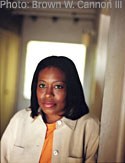Phenomenal Woman: Cupcake Brown

At 37, Cupcake Brown has only to pass the bar and she'll be a lawyer, with a $125,000-a-year job waiting for her at McCutchen, Doyle, Brown & Enersen, a white-collar criminal defense firm in San Francisco. Doggedly focused, she is busy these days and full of hope.
It wasn't always so. There was a time when she got up—or "came to," as she puts it—in the morning with nothing to look forward to but the pursuit of the next trick and the next high.
Brown—whose first name is the result of a nurse's misunderstanding of her mother's post-delivery request for a cupcake—remembers a happy childhood. "We lived in the ghetto, but it was home," she says. One morning she woke up to the sound of the alarm clock in the other room blaring on and on. Her mother had choked to death during a seizure. Brown was 11.
Placed in a series of foster homes where she was repeatedly abused physically and sexually, Brown started running away and selling her body in order to survive. At 12 she joined a gang and started "doing what gangs do: rob, steal, fight."
Two days before she turned 15, Brown nearly got her wish. She was shot in a drive-by and doctors told her she might not walk again. When she did, three weeks later, she knew it was time to leave gang life. That same year she left the foster care system for good, having herself declared legally emancipated. "I was 'grown,'" she says wryly, "so I did what I wanted, when I wanted, how I wanted." What she wanted most was oblivion, and she found it in heroin, crystal meth, marijuana, powder and crack cocaine, angel dust, alcohol, acid.
For many of its alumni, foster care proves to be a one-way ticket to failure. One study indicates that less than 8 percent manage to graduate from a four-year college. The few who do succeed have one thing in common: someone in their life who stands by them. Brown found that person at the age of 23, in Kenneth J. Rose, a San Diego attorney who gave her a job as a legal secretary.
Rose saw in Brown something she did not yet recognize in herself: her intelligence. "He acted like I was smart, and it just blew me away," she says. Nevertheless, as her responsibilities at work increased, so did her drug use. At one point, she lost her apartment and went on a four-day crack binge, winding up without her shoes, wearing nothing but a green dress, now brown with filth. "I happened to pass a window," Brown recalls, "and saw my reflection. My eyes were sunk in my head. My lips were burned and scabbed from the crack pipe. You could see my ribs. I had seen death before on other people. But I'd never seen it on me."
It wasn't always so. There was a time when she got up—or "came to," as she puts it—in the morning with nothing to look forward to but the pursuit of the next trick and the next high.
Brown—whose first name is the result of a nurse's misunderstanding of her mother's post-delivery request for a cupcake—remembers a happy childhood. "We lived in the ghetto, but it was home," she says. One morning she woke up to the sound of the alarm clock in the other room blaring on and on. Her mother had choked to death during a seizure. Brown was 11.
Placed in a series of foster homes where she was repeatedly abused physically and sexually, Brown started running away and selling her body in order to survive. At 12 she joined a gang and started "doing what gangs do: rob, steal, fight."
Two days before she turned 15, Brown nearly got her wish. She was shot in a drive-by and doctors told her she might not walk again. When she did, three weeks later, she knew it was time to leave gang life. That same year she left the foster care system for good, having herself declared legally emancipated. "I was 'grown,'" she says wryly, "so I did what I wanted, when I wanted, how I wanted." What she wanted most was oblivion, and she found it in heroin, crystal meth, marijuana, powder and crack cocaine, angel dust, alcohol, acid.
For many of its alumni, foster care proves to be a one-way ticket to failure. One study indicates that less than 8 percent manage to graduate from a four-year college. The few who do succeed have one thing in common: someone in their life who stands by them. Brown found that person at the age of 23, in Kenneth J. Rose, a San Diego attorney who gave her a job as a legal secretary.
Rose saw in Brown something she did not yet recognize in herself: her intelligence. "He acted like I was smart, and it just blew me away," she says. Nevertheless, as her responsibilities at work increased, so did her drug use. At one point, she lost her apartment and went on a four-day crack binge, winding up without her shoes, wearing nothing but a green dress, now brown with filth. "I happened to pass a window," Brown recalls, "and saw my reflection. My eyes were sunk in my head. My lips were burned and scabbed from the crack pipe. You could see my ribs. I had seen death before on other people. But I'd never seen it on me."



